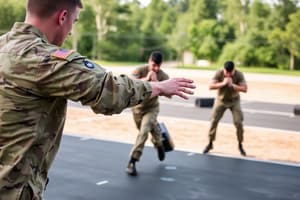Podcast
Questions and Answers
What does STEP stand for?
What does STEP stand for?
- Select, Train, Educate, Promote (correct)
- Strategic Education and Promotion
- Specialized Training for Effective Performance
- Systematic Training for Every Professional
What does NCOPDS stand for?
What does NCOPDS stand for?
Noncommissioned Officer Professional Development System
What does ACT stand for?
What does ACT stand for?
Army Career Tracker
What does IDP stand for?
What does IDP stand for?
What does the 'S' in STEP represent?
What does the 'S' in STEP represent?
What does the 'T' in STEP represent?
What does the 'T' in STEP represent?
What does the 'E' in STEP represent?
What does the 'E' in STEP represent?
What does the 'P' in STEP represent?
What does the 'P' in STEP represent?
What is the Basic Leader Course (BLC)?
What is the Basic Leader Course (BLC)?
What is the Advanced Leader Course (ALC)?
What is the Advanced Leader Course (ALC)?
What is the Army Emergency Relief Program?
What is the Army Emergency Relief Program?
What is the GPS Program?
What is the GPS Program?
What is SFL-TAP?
What is SFL-TAP?
What types of assistance does the Army provide?
What types of assistance does the Army provide?
What is the Capstone Event?
What is the Capstone Event?
What is the Military Life Cycle Transition Model?
What is the Military Life Cycle Transition Model?
Who is entitled to honors?
Who is entitled to honors?
Flashcards are hidden until you start studying
Study Notes
STEP Overview
- STEP stands for Select, Train, Educate, Promote, a framework to develop and promote Noncommissioned Officers (NCOs).
NCOPDS
- NCOPDS means Noncommissioned Officer Professional Development System, providing progressive training relevant to NCO responsibilities in operational units.
Army Career Tracker (ACT)
- ACT is the Army Career Tracker, a tool for integrating professional development across operational, institutional, and self-development domains.
Individual Development Plan (IDP)
- IDP stands for Individual Development Plan, designed to outline personal and professional growth objectives for service members.
Selection Process in STEP
- Selection for promotion considers potential based on a leader’s assessment of knowledge, skills, and attributes.
- Promotable NCOs must demonstrate leadership, care for Soldiers, and uphold standards while showcasing readiness for increased responsibility.
Training in STEP
- NCOs enhance tactical and technical skills through realistic and challenging training, vital for effective decision-making under stress.
Education in STEP
- NCO education includes both DLC and NCOPDS, focusing on preparing leaders for complex operational environments through ongoing professional development.
Promotion Criteria in STEP
- Eligibility for promotion requires meeting educational and training prerequisites along with competence in areas like Army Profession and lifelong learning.
Basic Leader Course (BLC)
- BLC trains specialists and corporals for sergeant roles, emphasizing skills in leadership, communication, problem-solving, and effective team building.
Advanced Leader Course (ALC)
- ALC comprises technical and leader core competencies, advancing NCO skills further in leadership.
Saluting Protocols
- The U.S. Flag should not be dipped as a salute; however, organizational colors may be dipped during specific ceremonies when honoring individuals.
Cannon Salutes
- Cannon salutes require the presence of a commissioned officer and are not conducted during specific times, with exceptions for international courtesy.
Honors Eligibility
- High-ranking officials, such as the Speaker of the House and the Chairman of the Joint Chiefs of Staff, are entitled to military honors during visits.
Charge to the Noncommissioned Officer
- Recited during promotions, this charge emphasizes NCO responsibilities, discipline, and respect for Army traditions and the chain of command.
NCO Vision
- The NCO Vision focuses on leadership, training, and motivating Soldiers, promoting adaptation and a commitment to continuous learning.
Importance of Customs and Traditions
- Army customs and traditions motivate service members and are essential to the institution's heritage and leadership development.
Types of Assistance Available
- Assistance types include emergency financial aid and support for families of deceased Soldiers, generally provided as interest-free loans.
Army Emergency Relief Program (AER)
- AER is the primary financial assistance organization dedicated to serving soldiers and their families.
GPS Program
- The Transition Goals, Plans, and Success Program aids service members in meeting career readiness standards for a successful civilian transition.
Five-Day Core Curriculum
- This program helps service members translate military skills to civilian credentials and includes financial planning and mandatory VA benefits briefings.
SFL-TAP Overview
- The Life-Transition Assistance Program (SFL-TAP) prepares transitioning service members for new careers and connects them with employers.
Mandatory Pre-Transition Steps
- Pre-separation counseling and other briefings are mandatory for Soldiers before transitioning, ideally starting 24 months prior to separation.
Assessments and Counseling
- Pre-separation counseling informs eligible service members about services, benefits, and necessary documentation during and after their military service.
Capstone Event
- A mandatory verification process assesses a service member’s preparedness for civilian life, requiring documentation of an Individual Transition Plan.
Military Life Cycle Transition Model
- This model outlines key phases in a service member’s career to align military experiences with civilian career paths while enhancing Career Readiness Standards.
Studying That Suits You
Use AI to generate personalized quizzes and flashcards to suit your learning preferences.




